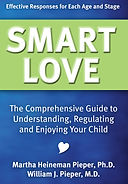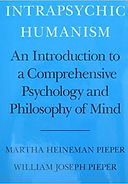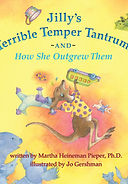Publications

Addicted to Unhappiness: How Hidden Motives for Unhappiness Keep You from Creating the Life You Truly Want, and What You Can Do
By Martha Heineman Pieper, Ph.D., and William J. Pieper, M.D.
Everyone is born with the potential to live fulfilled lives, but many find it difficult to realize that potential. Using real-life examples, the authors provide insights and effective strategies that will help anyone choose and maintain the happiness he or she deserves.

Smart Love: The Comprehensive Guide to Understanding, Regulating and Enjoying Your Child
By Martha Heineman Pieper, Ph.D., and William J. Pieper, M.D.
Smart Love enables parents to understand the world through the eyes of their child at each stage of development. To "Smart Love" is to cultivate children's inner happiness while managing their behavior in age-appropriate ways, which ensures that children will grow up well behaved, responsible, self-confident, and able to reach their full potentials.

Mommy, Daddy, I Had a Bad Dream!
By Martha Heineman Pieper, Ph.D.
This endearing children’s story helps children and parents alike make sense of the nearly universal experience of having a bad dream. Winner of the Bronze Award from the Independent Publisher (IPPY) in the National Category of Children’s Books and the Mom's Choice Awards Highest Honor, Gold Seal of Excellence, this story tells of Joey, a happy bouncy kangaroo, who has a series of bad dreams and how his parents lovingly help him understand them.

Intrapsychic Humanism: An Introduction to a Comprehensive Psychology and Philosophy of Mind
By Martha Heineman Pieper, Ph.D., and William J. Pieper, M.D.
This groundbreaking book provides readers with a unified and inclusive theory of paradigmatic human experience, psychopathology, and psychological treatment. Intrapsychic Humanism presents a uniquely positive view of human nature.
Please Note:
Revised version is updated on Kindle. To ensure you have the latest version enable Automatic Book Updates in your Kindle app under "Book Updates" in your Settings.

Jilly's Terrible Temper Tantrums: And How She Outgrew Them
By Martha Heineman Pieper, Ph.D.
When Jilly, a happy little kangaroo, has a series of Terrible Temper Tantrums, her parents lovingly help her through them. Children will be very familiar with the frustrations that trigger Jilly's upset feelings, and will applaud her dawning understanding that seeking help and a hug is far superior to the misery of a temper tantrum. Winner of a Gold Mom's Choice Award and First Place in Purple Dragonfly Awards in the categories of Picture Books and Growing Pains.







